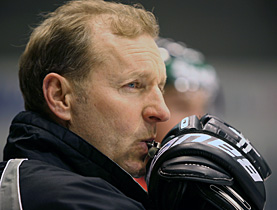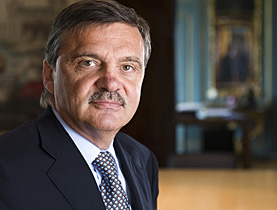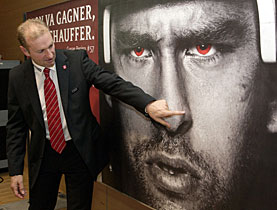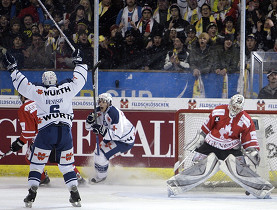Coach Krueger balances ambition and pragmatism

Switzerland's ultimate ice hockey insider tells swissinfo that being an outsider is an advantage, and it's an arrangement that has suited him well for over a decade.
Coaching the alpine country’s national men’s team has been “a dream job” for the past 12 years for Canadian-born Ralph Krueger, a former player in Europe’s professional leagues.
Never short on words – both in English and his particular brand of anglicised German – Krueger explained after a practice session in Geneva that having entered the scene as a relative outsider also helped him navigate the sport’s politics.
Switzerland faces tough challenges from more powerful European and North American rivals but Krueger says he is focusing on preparing his team before thinking about winning.
swissinfo: How will you define success this year, both as a coach and for the team?
Ralph Krueger: As a national coach, I define success over longer periods. When my time is done, I want to know the programme has moved forward and developed. We were 18th in the world in 1997 and now we’re seventh in the world rankings.
To defend the position at the world tournament is one of my major goals and I’ll do whatever it’s going to take to do that. Of you course, you always want more. Our chances of winning a medal at the world championships aren’t very high, but we dream about that and work for that. I’ll accept it if the players give all they have.
swissinfo: You’ve been coach of the Swiss team for 12 years. What has kept you here?
R.K.: One of the key things at the beginning was to deal with the politics in Switzerland – to be able to find a neutral position, like the country. It was an advantage for me to come in as an outsider, to come into Swiss hockey without having really worked with a club team before.
The other thing is just being really honest with the guys and with the programme. I tell the truth; I don’t play any games with anybody. Everybody knows what’s expected here. The mix between Canadian and European culture makes our game unique and has given me the opportunity to survive.
swissinfo: Depending on the result at the 2010 Olympics in Vancouver, are you looking to beat the 16-year record of former Soviet coach Viktor Tikhonov?
R.K.: That’s not as important to me as having a great Olympic games. My contract takes me through the world championships in Germany three months later, so there’s no reason for me to make a decision before the Olympics. I want to focus on these two tournaments and then I’ll see what’s happening in Swiss hockey, how I feel, how they feel about me…
swissinfo: Do you miss playing?
R.K.: Not at all. I’m a person who moves forward – in good times and in bad – and when my time was up, I felt it was up.
I love coaching. I’m in it for my 20th season now. As a Canadian living in Europe and being able to enjoy the game, I love being in a job that has really been the dream job for the past 12 years.
swissinfo: Some players are based in North America, some in Europe. Both German and English are spoken. Describe this dynamic.
R.K.: Nobody on this national team has played for another national coach, so they’ve got to know what I mean without me having to say it sometimes. That’s an advantage of continuity.
We speak kind of a “Denglish”. That’s a mix between Deutsch and English and I can understand the French. We find our way. It’s more an emotional group that we have. When you’re here a long time, there’s not a lot to say.
swissinfo: Do you have enough time leading up to major tournaments to put together a cohesive team?
R.K.: It would be disastrous for the programme if they reduced the time, but I know there are people out there who want to do that. We need every day we can get.
We’re not playing against the best teams in Europe – we’re playing against the best teams in the world. There are 750 NHL players that become a factor at the world tournaments and Olympics, so what we’re preparing for here is something the players can never experience, even in the Champions Hockey League. I’m happy with the time I have now and if they reduce it, it would be really bad for the programme.
swissinfo: How do you balance the pressure of playing before a home crowd with staying relaxed?
R.K.: A lot of it comes from the character we’ve selected for the national programme. These are players that just love to play the game. They don’t think too much, they’re uncomplicated.
A lot of our key guys are getting older but also getting better. We’re still a very young team – we’ll average about 26 at the world tournament, which is young. Canada was over 30, the US was over 30, Belarus over 30, as were many others at the previous Olympic Games.
swissinfo: How about the prospects for younger players like Luca Sbisa, Roman Josi and Yannick Weber?
R.K.: We’re certainly not promising anybody a free ticket to the world tournament, but players like Sbisa, Josi and Weber are definitely the future of Swiss hockey. Whether they’re ready now will depend a bit on when they’re available.
We’ve got a lot of experience in our group and we won’t be making any drastic changes as we head toward the Olympic games and this home world tournament.
swissinfo: Is enough being done to develop young talent within Switzerland?
R.K.: We’re definitely happy with a lot of things that are happening: everybody really loves the game in Switzerland and there’s a lot of passion. The kids that play the game play really passionately.
We’re not so happy with what sometimes happens to players between 18 and 22. Sometimes things happen a little too quickly for them and they quit working. Maybe the most important phase in a hockey player’s career is when he goes from being a teenager to an adult. One of the things I battle here endlessly is how easy and protected the players sometimes get.
I would prefer it if there weren’t as many teams in the first division. That would increase the competition because sometimes our players are left in a vacuum. That’s probably my biggest beef. We’re still physically not [as big as we should be]. I think we can probably develop more off-ice than anywhere. But we’re inching forward.
swissinfo: Is Switzerland a hockey nation?
R.K.: No question about it. It’s the most passionate, compact country in the world. You can go into any town, anywhere – north, east, south, west – and you can feel the game. There are rinks and people who play it and have a favourite team. There are a lot of local rivalries. This is a passionate hockey nation.
swissinfo-interview: Justin Häne in Geneva
The 2009 Ice Hockey World Championship takes place from April 24 to May 10 in Bern and Zurich.
Over 300,000 spectators are expected to attend and another 800 million will watch on television.
It is the tenth time Switzerland has hosted the tournament.
Ralph Krueger was born in 1959 in Winnipeg, Canada.
He has been the coach of the Swiss men’s team since the 1997-98 season.
Prior to his coaching career, Krueger played 350 games in Germany’s Deutsche Eishockey-Liga, scoring 187 goals, with 186 assists.
He played 45 games for the West German ice hockey team.
Krueger began his coaching career in Germany and led the Austrian club VEU Feldkirch to five national championships and a European title in 1998.
Krueger is married with two children with two children and holds Canadian and German passports.
He has lived in Davos since 1997.
Preliminary round
The tournament’s 16 teams are split into four groups of four. Each team plays three matches in round robin play. The top three from each group move to the qualifying round.
Qualifying round
The remaining twelve teams are divided into two groups of six. Each team has to play three games within their group.
Quarterfinal
The top four teams from each group make it to the quarterfinal. The bottom two teams from each group are eliminated.
Semifinal
The top four teams from the quarterfinal move to the semifinal.
Bronze medal game
The two losers of the semi-final games face off.
Final
The winners of the semi-final round play the tournament’s final match.

In compliance with the JTI standards
More: SWI swissinfo.ch certified by the Journalism Trust Initiative



You can find an overview of ongoing debates with our journalists here. Please join us!
If you want to start a conversation about a topic raised in this article or want to report factual errors, email us at english@swissinfo.ch.